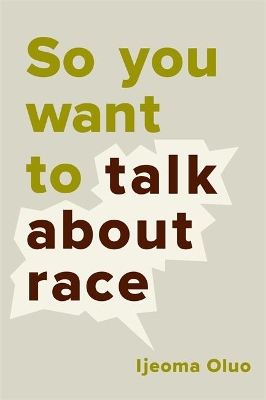
In So You Want to Talk About Race, Editor at Large of The Establishment Ijeoma Oluo offers a contemporary, accessible take on the racial landscape in America, addressing head-on such issues as privilege, police brutality, intersectionality, micro-aggressions, the Black Lives Matter movement, and the "N" word. Perfectly positioned to bridge the gap between people of color and white Americans struggling with race complexities, Oluo answers the questions readers don't dare ask, and explains the concepts that continue to elude everyday Americans.
Oluo is an exceptional writer with a rare ability to be straightforward, funny, and effective in her coverage of sensitive, hyper-charged issues in America. Her messages are passionate but finely tuned, and crystalize ideas that would otherwise be vague by empowering them with aha-moment clarity. Her writing brings to mind voices like Ta-Nehisi Coates and Roxane Gay, and Jessica Valenti in Full Frontal Feminism, and a young Gloria Naylor, particularly in Naylor's seminal essay "The Meaning of a Word."
- ISBN10 1580056776
- ISBN13 9781580056779
- Publish Date 8 February 2018 (first published 16 January 2018)
- Publish Status Out of Print
- Out of Print 14 September 2021
- Publish Country US
- Imprint Seal Press
- Format Hardcover
- Pages 256
- Language English
Reviews


clq
It’s disturbingly tough to face up to, and not least internalize, the role every white person plays in racial issues. It’s hard, as a white person who likes to think of myself as a supporter of all equality, to face up to the extent to which the comforts I enjoy in life have been supported by a society built on white supremacy. It’s uncomfortable to think about the fact that so much of what I enjoy has been at the cost of others having no opportunity to enjoy the same things. None of this is my fault, but, as someone who would like an equal society, all of this is my problem. The only way to even begin fixing it is to recognize it as the problem it is. It would be silly and dishonest to pretend that reading this, or any, book would absolve me of my ignorance on the topic, but the book certainly crystallized, and gave me the language to further consider, many of the issues I’ve known about, thought about, but not properly considered.
One of the things in the book that resonated the most with me is the danger (or, rather, uselessness) of white people getting defensive when discussing racial issues. It’s natural to become defensive when faced with the fact “As a white person, you benefit from white supremacy.” It’s uncomfortable, but it’s inescapable, and no amount of “but… but…” will make it less true. I think I understand now more than I did how important this acknowledgement is in all discussions on racial issues. Anyone discussing the issue needs to have this in mind: white people have no way — can have no way — of being able to see racial issues in the same way black and brown people do, and that’s OK, as long as it’s universally understood. At least here in Norway this is something that feels to me like a massive and recurring problem, so much of the debate takes place between white people who are ignorant of the fact that, while they do of course have the right to express an opinion, their opinion on racial issues cannot be and will never be as valid as the opinions and experiences of those who live with the issues. That’s something we need to face up to, not something we can skirt around or ignore.
The truths on the topic of race may be uncomfortable for white people to acknowledge, and that’s OK, even necessary, because the truths are uncomfortable ones. But the moment I, or any white person, starts feeling sorry for themselves because of that discomfort is the moment we need to take a huge step back and get some perspective. Our role in racial issues is a discomfort we experience whenever we happen to think about it. To black and brown people racial issues is a lived reality that can’t be escaped. I can be as well-meaning as I like, but what am I actually doing about the problem? I like to think that I would desperately want to live in a world where skin colour is irrelevant, but what am I doing to achieve that? Am I doing everything I could be doing, and, if I’m not, am I not part of the problem? Those are uncomfortable questions that this book posed, and that I think I’ve just started grappling with, that I will continue grappling with, and that I think many more white people need to grapple with if the world is ever going to change.
One thing is being generally aware of racial issues, and generally supportive of the movement to create equality. Sitting down and reading a book about the reason these movements matter, and hearing about the lived experiences of people who absolutely need such movements to live as equals, is another. Nothing this book gave me came as a surprise, which makes it all the more a shame that I haven’t delved into a book like this earlier. I’ll make sure to read more voices like this, as I think most people probably should. Whether it’s through a book by a BME author talking about their experiences, whether it’s through this particular book, or whether it’s through another form of listening, I think listening is something we need to do much more of. And by “we” I mean people like me, for whom the social justice movement is something we are glad to see and something we are glad to support, rather than a very real fight against a status quo that considers us inferior due to the colour of our skin.

